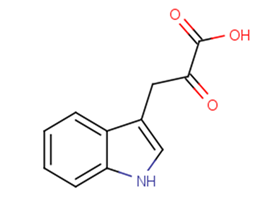
Indole-3-pyruvic acid
CAS No. 392-12-1
Indole-3-pyruvic acid( 3-(3-Indolyl)-2-oxopropanoic acid )
Catalog No. M19918 CAS No. 392-12-1
Indole-3-pyruvic Acid is a compound involved in the biosynthesis of Indole-3-acetic acid a plant hormone which plays important roles in regulating growth and responses to environmental changes.
Purity : >98% (HPLC)
 COA
COA
 Datasheet
Datasheet
 HNMR
HNMR
 HPLC
HPLC
 MSDS
MSDS
 Handing Instructions
Handing Instructions
| Size | Price / USD | Stock | Quantity |
| 50MG | 37 | In Stock |


|
| 100MG | 59 | In Stock |


|
| 200MG | Get Quote | In Stock |


|
| 500MG | Get Quote | In Stock |


|
| 1G | Get Quote | In Stock |


|
Biological Information
-
Product NameIndole-3-pyruvic acid
-
NoteResearch use only, not for human use.
-
Brief DescriptionIndole-3-pyruvic Acid is a compound involved in the biosynthesis of Indole-3-acetic acid a plant hormone which plays important roles in regulating growth and responses to environmental changes.
-
DescriptionIndole-3-pyruvic Acid is a compound involved in the biosynthesis of Indole-3-acetic acid a plant hormone which plays important roles in regulating growth and responses to environmental changes.
-
In VitroRT-PCR Cell Line:HaCaT cells Concentration:5-25 mM Incubation Time:6 h Result:Inhibited UVB-stimulated mRNA expression of IL-1β, IL-6, and cyclooxygenase 2 (Cox-2).
-
In VivoAnimal Model:BALB/c mice Dosage:Fed in MF chow.0.1% for 5 dAdministration:Oral administration Result:Up-regulated the expression of Cyp1a1 (a biomarker for AHR activation) in the colon.Animal Model:T cell–mediated colitis model of SCID miceDosage:Fed in MF chow.0.1% for 5 wk Administration:Oral administration Result:Suppressed diarrhea and improved colon inflammation.Down-regulated the expression of Th1 and proinflammatory cytokines and upregulated the expression of IL-10 in the colon.Animal Model:HR-1 Hairless Mice Dosage:100 μM Administration:Dose at skin Result:Enhanced the epidermal thickness.Attenuated UVB-induced necrosis observed in upper layer of dermis.
-
Synonyms3-(3-Indolyl)-2-oxopropanoic acid
-
PathwayOthers
-
TargetOther Targets
-
RecptorOthers
-
Research Area——
-
Indication——
Chemical Information
-
CAS Number392-12-1
-
Formula Weight203.19
-
Molecular FormulaC11H9NO3
-
Purity>98% (HPLC)
-
SolubilityDMSO:10 mM
-
SMILESOC(=O)C(=O)Cc1c[nH]c2ccccc12
-
Chemical Name——
Shipping & Storage Information
-
Storage(-20℃)
-
ShippingWith Ice Pack
-
Stability≥ 2 years
Reference
1.Kneen MM et al. Characterization of a thiamin diphosphate-dependent phenylpyruvate decarboxylase from Saccharomyces cerevisiae. FEBS J. 2011 Jun;278(11):1842-53.
molnova catalog



related products
-
Acrylamide monomer
Acrylamide is a member of the class of acrylamides. It has a role as a carcinogenic agent a neurotoxin a mutagen an alkylating agent and a Maillard reaction product.
-
Isovitexin 2-O-arabi...
Isovitexin 2''-O-arabinoside is a flavonoid found in the alfalfa plant.
-
25-O-Methylalisol A
25-O-Methylalisol A is a natural product.



 Cart
Cart
 sales@molnova.com
sales@molnova.com


